- Home
- Michael Grant
In the Time of Famine
In the Time of Famine Read online
In The Time Of Famine
by Michael Grant
Copyright 2011 Michael Grant
Smashwords Edition
DEDICATION
The book is dedicated to the millions of nameless men, women, and children who suffered and died in the an Gorta Mór, the Great Hunger of 1845-1850.
ACKNOWLEDGMENTS
In researching this novel I read many excellent books on the Irish Potato Famine. But I especially relied on historian Cecil Woodham Smith's seminal book on the Irish Famine entitled The Great Hunger. I highly recommend this book to anyone who has a serious interest in the history of the Famine.
Special thanks to Sandi Nadolny and Elizabeth Nardone for their careful and meticulous reading of the manuscript. Nevertheless, if there are any errors in this book, the fault is entirely mine.
CHAPTER One
September 1845
Ballyross, Ireland
The rains were steady and relentless the summer of 1845. At the time, most thought little of it. What else could one expect from the vagaries of the harsh, unpredictable climate of western Ireland? But tenant farmers, superstitious and fearful by nature, were always on the lookout for portents of misfortune. A crow flying too high, an owl abroad in daylight, or a deformed newborn calf was enough to send men scurrying to the parish priest for explanations. These men of the soil, who barely eked out a living in the best of times, viewed the unusual rains of ’45 with vague dread and foreboding.
Now it was mid-September and, in spite of all their prayers and entreaties, the rains continued unabated. Since dawn, black clouds had been scudding across a heavy gray sky promising yet more rain. A damp wind, funneled by the mountains to the west, swept across the valley, causing the wheat to roil like waves in a golden sea. In a field, two men, bracing against the stiff wind, swung their scythes, slowly wading through the golden waves one-step at a time. They worked in silence—the only sound was the moaning of the wind in the wheat, the soft swish of scythes, and the occasional caw, caw of a distant crow.
To look at these two men one would never suspect they were brothers. Michael, almost six feet tall, towered over his younger brother by more than a foot. He had thick curly black hair and dark blue eyes that never failed to send shivers through the bodies of the young girls in the village. He possessed a natural grace and bearing not often found in peasant stock. He swung his scythe in a graceful, rhythmic arc as though the tool were an extension of his body.
Dermot, short and compact like their father, had close-set eyes that gave him the vague look of an imbecile. His unruly hair, the color and texture of straw, didn’t help matters. The same girls who nudged each other and giggled when they saw Michael, snickered in derision at Dermot. With a scowl that seldom left his face, Dermot hacked at the wheat with choppy, uncoordinated strokes as thought he’d never gotten accustomed to the shortness of his arms and legs.
Reaping was hard on the body, but Michael didn’t mind. He was young—he’d just turned twenty-four—and his body was hard from toiling in the fields since he was nine. Besides, the rote nature of the work freed his mind to think of other things. And what he was thinking about now, and had been thinking about for the better part of three years, was an idea so fantastic, so daft, so daunting in its implications that even now he could barely grasp it.
Just the night before he’d dug up the box again to reassure himself that he did indeed have the money. The sight of all those shiny coins never failed to take his breath away. He could scarcely believe he’d amassed such a fortune. One by one he counted the coins. Then he carefully put them back in the box and reburied them. He sat there for a long time in the darkness with his back against a tree, reflecting on what he’d gone through to earn them.
After the harvest, when the wheat and the potatoes and the corn were in, there were long winter months when there was little to be done but wait for the spring and a new season of planting. Most farmers welcomed this annual respite from grueling fourteen-hour days in the fields and holed up in their cottages, content to snuggle close to their warm turf fires, smoke their pipes, and sip their jars of “poteen”—a potent homemade whiskey. Michael, forgoing these meager comforts, took this opportunity to go out into the countryside to find work.
In a rural land where the preferred currency was barter, earning coin was a formidable task at best. Still, day after day he trudged from village to village in the cold and the rain. He begged, cajoled, and employed his considerable charm to convince merchants that he was a trustworthy lad whom they could count on to pick up and deliver their goods on time and in prime condition.
It was lonely work traveling the roads for such paltry wages. He cut expenses by eating whatever a passing field had to offer and sleeping in a ditch or barn instead of an inn. He’d gone as far as Dublin, but most trips were no more than twenty miles from Ballyross. Sometimes he was taken advantage of by merchants who paid him less than the agreed price. Others cheated him out of his money entirely. But he refused to give up. He soon discovered who the honest merchants were and hauled their goods day and night in the cold and the wet. For three long years he did that and now, finally, after collecting a shilling here, a half-crown there, he’d saved enough.
By all rights he should have been happy, but to his dismay, now that the time to make a decision was at hand, he found himself wavering. Making decisions—big or small—was not something the son of a tenant farmer was accustomed to doing. Michael’s life—indeed the life of every tenant farmer—was simple and preordained. A man was born. He worked his father’s rented fields, ate his father’s food, and slept in his father’s cottage until he married. And then the cycle started all over again when his sons were born.
But Michael wanted none of that. He was convinced that there had to be more to life than tending rented fields and living in constant dread of being turned off the land at the whim of a landlord. There had to be a better place and Michael knew where that place was: America.
Da must be expectin’ it, he told himself as he swung the scythe. He knows I’ve been workin’ and savin’ money. Sure he’ll be all right. He’ll have Dermot. Michael glanced at his younger brother listlessly hacking at the wheat and knew that was a lie. The God’s truth was Dermot would be no help at all.
“Is it time yet do you think, Michael?” Dermot’s scowl had given way to a wide, lopsided grin.
The question brought Michael out of his musings and he was grateful for the momentary reprieve from making a decision about America.
“You’ve been askin’ me that all day. When it’s time Da will come get us.”
Michael pretended not to care, but the truth was, he was as excited as Dermot. There were only three times when the fiddles and the poteen were brought out—weddings, wakes, and the end of harvest. And the reason for Dermot’s uncharacteristic excitement was because tonight Michael’s best friend, Bobby Ryan, was getting married.
“Will Old Genie be there do you think?” Dermot asked.
“Isn’t he always?”
“I like it when there’s a fiddler.” Dermot leaned on his scythe and stared dreamily off into the distance. “I get to put me arms around the girls when we dance.”
“You mind how you hold the girls or you’ll be gettin’ married yourself.”
Dermot reddened. “Don’t be daft.”
“Is there anyone you have an eye on then?” Michael asked, amused at his brother’s sudden discomfort.
“No. You?”
Michael shook his head.
Dermot leered. “What about Moira Boyle?”
“Shut your gub,” Michael said sharply. “She’s marryin’ Bobby.”
“Aye, but she was sweet on you. Why didn’t you marry her?”
&n
bsp; “Get back to work or Da will have us here all night and we’ll miss the weddin’.”
As he went back to his mowing, Michael asked himself that same question. Why didn’t he marry her? Moira was certainly pretty—with gray eyes and hair the color of a raven. And she was willin’. God knows she was willin’—in the barn, in the field, down by the river. And God knows he was willin’ as well. And why not? He didn’t know if it was love, but when he lay with Moira he was transported from his dreary world to a world of pleasure and joy that was almost painful.
But it wasn’t enough. She was seventeen and pretty now, but in ten years, if she didn’t die in childbirth, she’d be a tired old woman and him a tired old man. He could accept even that, if only she had something more to offer than her beauty. One night after an exhausting bout of lovemaking, as they lay on a haystack staring up at a sky filled with stars, he’d said to her, “Moira, do you think there’s a better life somewhere away from here?”
He might as well have asked her if she’d fancy flying to the moon on the back of a pig. She sat up and, leaning on one elbow, snapped, “What kind of talk is that, Michael Ranahan? Tis here we live and we’ll do like our das and mams have always done. I don’t like it when you talk queer like that.”
That was almost six months ago. And it was the last time he made love to her.
“Thank Jasus, here he comes,” Dermot said, wiping his brow with his sweat-soaked cap.
Michael glanced over his shoulder. In the distance, a wagon approached trailing a plume of brown dust.
“By Christ, we’re goin’ to a weddin’!” Dermot danced an awkward jig on the newly mown wheat.
“You’d best keep workin’ by Christ or it’s no place you’ll be goin’.”
From atop the wagon Da set his short, thick legs wide apart to maintain his balance as the slow-moving wagon lurched across ruts in the uneven field. He was a small, compact man with a weather-beaten face that made him look a decade older than his forty-eight years. Wild, unruly gray hair stuck out from under a shapeless, wide-brimmed hat that covered his eyes.
He squinted at the two figures at the far end of the field. Even from this distance, and with his poor eyesight, he could easily tell his two sons apart by the way they handled the scythes. Watching Dermot you’d think he’d never swung a scythe in his life. But Da knew better. It wasn’t incompetence at work here. It was the devil’s own laziness.
Da reined in the horse beside his two sons and inspected the field. “Is this all you’ve got done then?”
“The blade needs sharpenin’,” Dermot said, trying to keep a straight face.
“And what’s your excuse?” Da asked his eldest son.
Michael made no attempt to hide his grin. “There’s gonna be a weddin’, Da.”
Da’s ruddy face darkened. “In my time no one got married before the harvest was in. And we didn’t stop the mowin’ till dark. And—”
He stopped talking when he saw his two sons grinning at each other like a couple of eejits. “Get in the wagon the pair of you. Sure you’ll be useless the rest of the day.”
Chapter Two
Birthdays and anniversaries were never a cause for celebration for the Irish peasant. They were just another day in the week and the work had to be done all the same. But a wedding was something special—a welcome, if short, reprieve from the flint-hard life of tenant farming. For a few hours there could be joy and hope, the promise of children. The promise of renewed life.
Tenant farmers were the poorest of the poor. They lived in hovels not their own. They worked land not their own and barely survived from harvest to harvest. Still, when there was a wedding, everyone found a way to make a contribution to this most happy day.
Now, as the sun, making its only appearance of the day, sank behind the western mountains, friends and neighbors converged on the cottage of Brian Boyle, the father of the bride. They deposited their meager gifts of buttermilk, pans of boxty, and jars of poteen on the wedding table by the door.
Tapping his foot to keep time, old Genie Connor sawed his way through a jig while a handful of young men and women whirled around a blazing bonfire. He was not the most talented fiddler in the county but what he lacked in ability, he made up with enthusiasm.
Within an hour the red sky had given way to blackness and the night air, damp and chilly, brought everyone close to the warmth of the raging fire. Michael, warming his hands, stood with his friends, watching the dancers.
Pat Doyle, a giant of a man with flaming red hair, eyed the dancers wistfully. “Sure it seems like only yesterday I was married meself. Now I have six wee ones at home.”
Barry Scanlon, a man with large protruding eyes that gave him a look of perpetual surprise, handed him a jar of poteen. “For the love of God, Pat. It’s a weddin’. Don’t be thinkin’ such cheerless things.”
“What are ya talkin’ about, man? Getting’ married was the best thing I ever done,” newly married Martin Duane offered.
“You’ve got a wife and her old mam in the bargain,” Jerry Fowler said, taking his turn at the jar. “If that’s the best thing you’ve ever done, I’d not like to see the worst.”
Duane shrugged, not sure if he should take offense at Fowler’s remark. That was the impact Jerry Fowler had on a lot of people. He delighted in saying things, cutting, insulting things, that coming from anyone else would surely provoke a fight. But if challenged, Fowler, a man of uncommon good looks and a persuasive charm that never failed to fool the unwary, would always feign surprise that his remarks had been taken wrong.
Scanlon, breaking the uncomfortable silence, said, “Pay no mind to Martin. He’s not been right since he was kicked in the head by Lord Attwood’s mule.”
Over the ensuing laughter, Michael, who was not fooled by Fowler’s oily charm, said, “Taking his wife’s mam in was the decent thing to do. Of course it’s not somethin’ the likes of you would understand.”
Fowler turned his winning smile on Michael. “Ah, for the love of God, man. Can you not recognize a jest when you hear it?”
Doyle, knowing how Michael felt about Fowler, snatched the jar from Fowler and shoved it at Flanagan. “Shut your gub the two of yez.”
Matty Flanagan took a sip, grimaced and nodded at Genie. “You know with every nip, Genie’s soundin’ better and better.”
Just then, Dermot danced by with a red-headed girl, hopping up and down, hopelessly out of sync with the rest of the dancers. His short legs could barely keep up with the taller girl, but he wouldn’t let go of her waist.
Someone passed the jar to Michael. He took a swig and winced. Homemade poteen was never smooth, but this batch was particularly harsh. He passed it to Martin. The young farmer took his swig and shuddered. “Jasus, tis pig piss!”
A sweating Dermot elbowed his way into the group. The air was chilly, even by the fire, but the exertion of dancing had brought a sweaty sheen to his flushed face. “Give it here.”
Martin handed him the jar. “Maureen send you off?”
“There’s plenty of girls. Who needs Maureen Brady?”
Doyle winked at the others. “She sent him off.”
Michael noticed his brother’s eyes were getting glassy. “Go easy on that,” he said. “We’ve the field to finish tomorrow.”
“Don’t you worry about me.” Dermot took a swig and passed the jug to Fowler and disappeared into the crowd of dancers as Bobby and Moira danced by.
“I wouldn’t mind bein’ in Bobby Ryan’s bed this night,” Fowler said, leering at the couple.
“Mind your tongue,” Michael said sharply.
Fowler’s eyes glistened from the poteen. “And what’s it to you? Are you still gettin’ it from her then?”
Michael lunged at Fowler, but Pat Doyle grabbed both of them by the collars and yanked them apart. “Now, now. Tis a weddin’. We’ll have no fightin’ here.” He shook Fowler. “And you mind your tongue. It’s the woman’s weddin’ day and you’ll not be disrespectin’ her or you’ll an
swer to me.”
Fowler pulled loose and held up the jar. “May they both live to be a hundred.” He winked at Michael and moved away.
“You’d do well to stay away from him,” Scanlon whispered to Michael. “He’s a dangerous one, he is. They say he once stabbed a man to death in a fight in Cork.”
“If he did, it was in the back,” Michael answered.
Doyle shoved the jar into Michael’s hand. “Have a sip and calm yerself.”
An angry Michael pushed the jar away and watched Fowler move among the dancers, mumbling remarks that made the girls blush and the men scowl uncertainly. There had been bad blood between them ever since Michael had taken Moira away from him a year ago. To hear Fowler tell it, Michael had stolen his one true love. The truth was Moira was terrified of Fowler and she’d told Michael that Fowler had hit her on more than one occasion.
As the night wore on and everyone got louder and the dancing wilder, the older people and young ones drifted home to their beds. The young men and women, not wanting to see this festive night end, tossed more logs on the fire and kept dancing. And old Genie and his fiddle was happy to oblige—as long as someone kept his jar filled.
Michael moved off to be by himself. He’d always enjoyed weddings and looked forward to a dance with the girls and a drink with the men, but tonight he felt as though he didn’t belong here. Weddings, he knew, led to other weddings and now, as he watched the young people paring off—including Dermot and Maureen—it occurred to him that he wouldn’t be here this time next year for their weddings and already he felt like an outsider. He’d grown up with these people, shared their good times and misfortunes. But that was all about to end. If he went out to America.
For the second time tonight a knot of uncertainty clenched his stomach. The first time had been earlier in the evening when he’d watched Moira and Bobby dancing together and wondered if he’d made a mistake letting her go. Who was he to think she wasn’t good enough for him? Who was he to think he could cross that great ocean and live in a strange land? And who was he to think he could be anything but a tenant farmer? America was far away. He knew no one there. Where would he live? How would he earn his keep?

 Fear
Fear Plague
Plague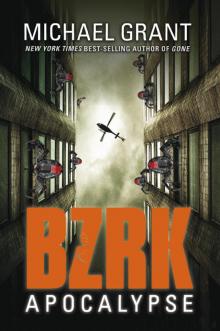 BZRK: Apocalypse
BZRK: Apocalypse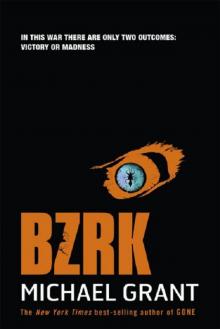 Bzrk
Bzrk Love Sucks and Then You Die
Love Sucks and Then You Die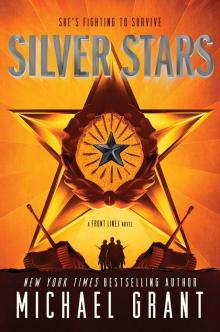 Silver Stars
Silver Stars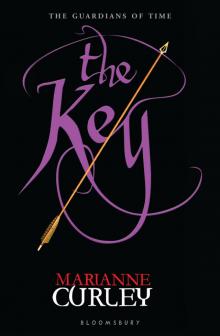 The Key
The Key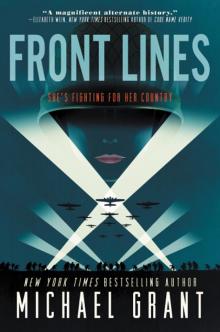 Front Lines
Front Lines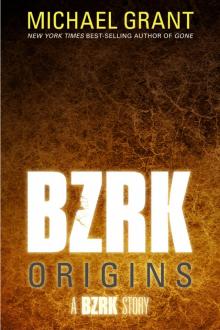 BZRK Origins
BZRK Origins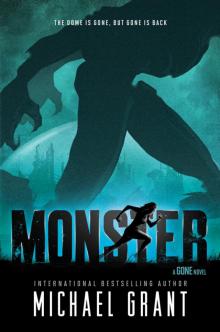 Monster
Monster Gone
Gone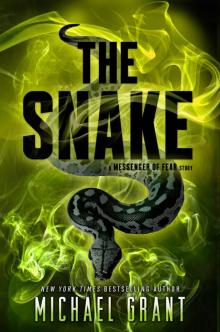 The Snake
The Snake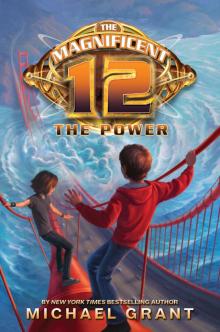 The Power
The Power Hunger
Hunger Lies
Lies A Sudden Death in Cyprus
A Sudden Death in Cyprus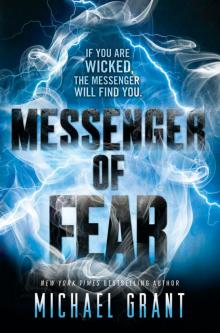 Messenger of Fear
Messenger of Fear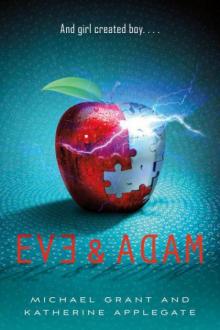 Eve & Adam
Eve & Adam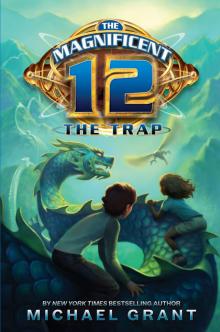 The Trap
The Trap Light
Light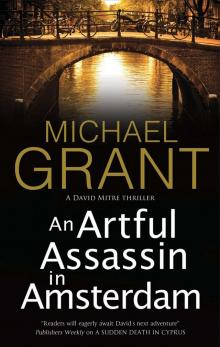 An Artful Assassin in Amsterdam
An Artful Assassin in Amsterdam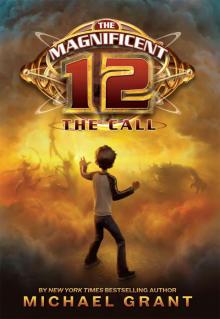 The Call
The Call Hero
Hero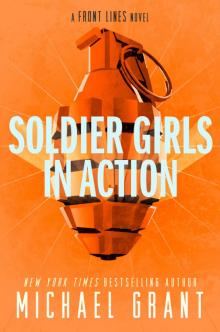 Soldier Girls in Action
Soldier Girls in Action Purple Hearts
Purple Hearts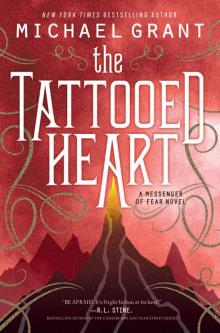 The Tattooed Heart
The Tattooed Heart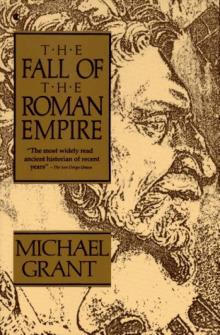 The Fall of the Roman Empire
The Fall of the Roman Empire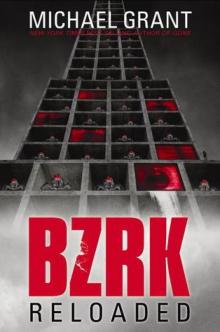 BZRK Reloaded
BZRK Reloaded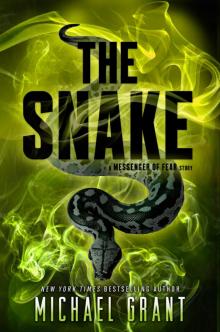 Messenger of Fear Novella #1
Messenger of Fear Novella #1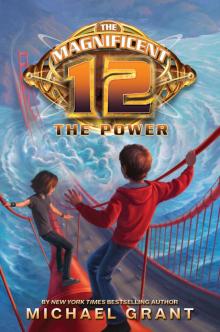 The Magnificent 12
The Magnificent 12 Fear: A Gone Novel
Fear: A Gone Novel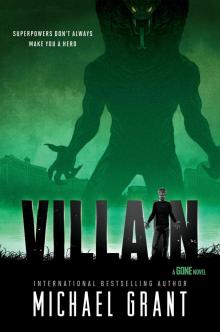 Villain
Villain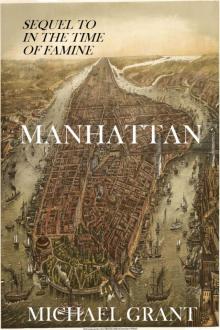 Manhattan
Manhattan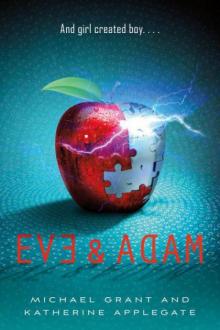 Eve and Adam
Eve and Adam Plague: A Gone Novel
Plague: A Gone Novel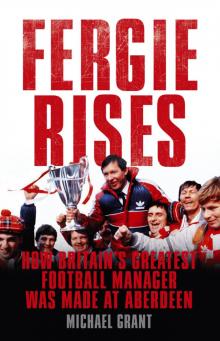 Fergie Rises
Fergie Rises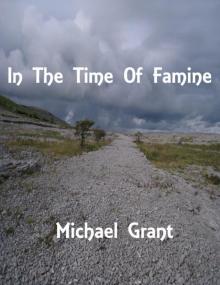 In the Time of Famine
In the Time of Famine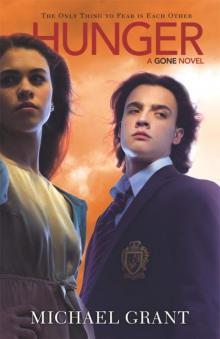 Hunger_A Gone Novel
Hunger_A Gone Novel Lies g-3
Lies g-3